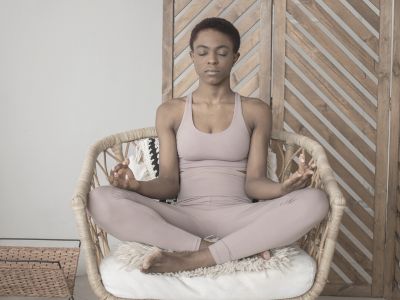Meditation is a technique that has been used for centuries to promote relaxation, reduce stress, and improve mental and physical health. It involves focusing one’s attention on something specific such as the breath or a mantra, while allowing thoughts and sensations to come and go without judgment. In recent years, research has shown that meditation has many benefits, both for the mind and the body.
The benefits of meditation

- Reducing stress and anxiety: Meditation can help reduce the production of stress hormones, such as cortisol, and increase the production of relaxation hormones, such as serotonin and endorphins, leading to reduced feelings of stress and anxiety.
- Improving mental focus and concentration: Meditation can improve attention and focus, enhancing cognitive abilities such as memory and problem-solving skills.
- Boosting the immune system: Regular meditation can strengthen the immune system by reducing inflammation and increasing the production of antibodies.
- Reducing symptoms of depression: Meditation has been shown to reduce symptoms of depression by increasing positive emotions and reducing negative emotions.
- Lowering blood pressure: Meditation has been found to lower blood pressure in people with high blood pressure.
- Improving sleep: Meditation can improve the quality of sleep by reducing stress and promoting relaxation.
- Reducing chronic pain: Meditation has been shown to reduce the perception of pain and improve pain tolerance.
- Enhancing emotional well-being: Meditation can improve emotional regulation, reduce feelings of loneliness, and increase feelings of happiness and contentment.
How meditation helps with stress and anxiety
When we are stressed or anxious, our bodies activate our sympathetic nervous system, which is responsible for our “fight or flight” response. This response is useful when we are in danger, as it prepares our bodies to respond quickly. However, in situations where there is no real danger, such as in everyday life, this response can lead to chronic stress and anxiety. Meditation helps to avoid this in the following ways:
Nervous system and hormones
Meditation helps to activate the parasympathetic nervous system, which has the opposite effect. It promotes relaxation and helps to reduce feelings of stress and anxiety. The practice of meditation also helps to reduce the heart rate and blood pressure, promoting a sense of calmness and relaxation.
Studies have shown that regular meditation practice can lead to a reduction in the production of stress hormones such as cortisol, and an increase in the production of relaxation hormones such as serotonin and endorphins.
Mental focus

Another way meditation helps to reduce stress and anxiety is by improving mental focus and concentration. Meditation involves training the mind to focus on a particular object or thought, such as the breath or a mantra. This practice helps to improve attention and focus, which can help to reduce feelings of stress and anxiety. When we are able to focus our attention on the present moment, we are less likely to dwell on the past or worry about the future, which are common triggers for stress and anxiety.
Emotional regulation
Meditation can also help to improve emotional regulation. When we are stressed or anxious, our emotions can become overwhelming, leading to feelings of panic or distress. Meditation helps to improve emotional regulation by training the mind to observe thoughts and emotions without judgment. This practice helps to create a sense of detachment from emotions, reducing the intensity of feelings such as fear, worry, and anxiety. Finally, meditation can help to promote a sense of self-awareness and acceptance. By focusing our attention on the present moment and observing thoughts and emotions without judgment, we become more aware of our thoughts and feelings. This increased self-awareness can help to reduce feelings of stress and anxiety by promoting acceptance and self-compassion.
How to start meditating
Choose a time and place
One of the first steps to starting a meditation practice is to choose a time and place to meditate. Find a quiet, comfortable place where you can sit or lie down without any distractions. Choose a time of day when you are most likely to be free from interruptions, and commit to meditating for a set amount of time each day.
Get comfortable

Once you have chosen a time and place to meditate, it is essential to get comfortable. Wear loose, comfortable clothing, and sit or lie down in a comfortable position. You can use a meditation cushion, chair, or a yoga mat to sit on.
Focus on your breath
The key to meditation is to focus your attention on your breath. Start by taking a few deep breaths and then allow your breath to become natural. Focus on the sensation of the breath as it enters and leaves your body. You can also use a mantra or a sound to focus your attention.
Be patient
Meditation is a practice, and it takes time and patience to develop. It is essential to approach meditation with an open mind and be patient with yourself. Start with a few minutes of meditation each day and gradually increase the time as you become more comfortable.
Don’t judge your thoughts
One of the most challenging aspects of meditation is dealing with distractions and thoughts. It is normal to have thoughts during meditation, and it is essential not to judge them. Instead, acknowledge the thoughts and then gently redirect your attention back to your breath.
Be consistent
Consistency is key when starting a meditation practice. Commit to meditating at the same time each day and make it a part of your daily routine. Even if you only have a few minutes to meditate, the consistent practice will help to develop your meditation skills over time.
Find out more
These sites are all good resources for finding out more about mediation:
Mindful is a magazine and website that focuses on mindfulness and meditation. They offer articles, videos, and courses on meditation, mindfulness, and overall well-being.
The UCLA Mindful Awareness Research Center provides free guided meditations for beginners and advanced meditators. Their website also features articles and courses on meditation and mindfulness.
The Art of Living is a non-profit organization that offers courses and workshops on meditation and mindfulness. Their website features articles and guided meditations on meditation and overall well-being.
More about relaxation

